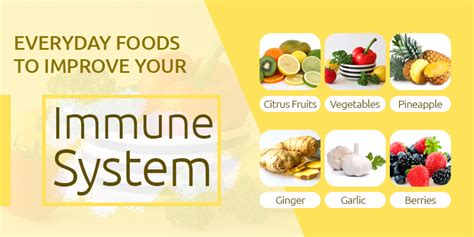How to Strengthen Your Immune System with Nutrition

A healthy immune system is crucial for protecting the body against harmful pathogens like viruses, bacteria, and other invaders. While many factors influence immune function—such as genetics, exercise, sleep, and stress—nutrition plays a foundational role in maintaining and strengthening the immune system. The foods we eat provide the vitamins, minerals, antioxidants, and other nutrients necessary to optimize immune health. This article will explore the best ways to nourish your immune system with nutrition.
Key Nutrients for Immune Health
The immune system relies on a variety of nutrients to function properly. Here are some of the most important:
Vitamin C
Vitamin C is one of the most well-known nutrients for boosting immunity. It acts as a powerful antioxidant, helping to protect immune cells from damage. Vitamin C also enhances the production and function of white blood cells, which are essential for fighting infections.
Sources of Vitamin C:
- Citrus fruits (oranges, grapefruits, lemons)
- Bell peppers
- Broccoli
- Kiwi
- Strawberries
Vitamin D
Vitamin D is essential for immune function. It helps activate immune cells, such as T-cells and macrophages, which identify and destroy pathogens. A deficiency in vitamin D has been linked to increased susceptibility to infections.
Sources of Vitamin D:
- Fatty fish (salmon, mackerel, sardines)
- Fortified foods (milk, cereals)
- Egg yolks
- Sunlight exposure
Zinc
Zinc is a mineral that plays a crucial role in the development and function of immune cells. It also helps regulate inflammation and oxidative stress, which can weaken the immune system when left unchecked. Zinc deficiency has been associated with impaired immune response.
Sources of Zinc:
- Meat (beef, lamb, poultry)
- Shellfish (oysters, crab)
- Legumes (chickpeas, lentils)
- Nuts and seeds
- Whole grains
Vitamin A
Vitamin A is vital for maintaining the health of mucosal surfaces in the respiratory and digestive tracts, which act as barriers to infection. It also supports the development of white blood cells and helps regulate immune responses.
Sources of Vitamin A:
- Carrots
- Sweet potatoes
- Spinach
- Kale
- Liver
Probiotics
Probiotics are beneficial bacteria that support gut health. Since a large portion of the immune system resides in the gut, maintaining a healthy gut microbiome is key to overall immune function. Probiotics help balance the gut microbiota and may enhance immune responses.
Sources of Probiotics:
- Yogurt with live cultures
- Kefir
- Sauerkraut
- Kimchi
- Miso
Iron
Iron is necessary for the proper function of immune cells, including T-cells, and plays a role in the production of hemoglobin, which carries oxygen throughout the body. A deficiency in iron can impair the immune response, leading to an increased risk of infections.
Sources of Iron:
- Red meat
- Poultry
- Leafy greens (spinach, kale)
- Legumes (beans, lentils)
- Fortified cereals
Building an Immune-Boosting Diet
A balanced, varied diet is the best way to ensure you get all the necessary nutrients to support your immune system. Here are some dietary strategies to help strengthen your immune system:
Eat a Colorful Array of Fruits and Vegetables
Fruits and vegetables are packed with essential vitamins, minerals, fiber, and antioxidants. Aim for a rainbow of colors on your plate, as different colors represent different nutrients. Red, orange, and yellow produce contain vitamin C, beta-carotene, and other antioxidants that support immune function, while dark leafy greens provide vitamin A, folate, and iron.
Incorporate Healthy Fats
Healthy fats, especially omega-3 fatty acids, help reduce inflammation and enhance immune responses. Omega-3s are found in fatty fish like salmon, walnuts, flaxseeds, and chia seeds. These fats also support overall health, including heart and brain function.
Opt for Lean Protein Sources
Protein is essential for immune function, as it provides the building blocks for immune cells and antibodies. Incorporate lean protein sources like chicken, turkey, legumes, and plant-based proteins (such as tofu and tempeh) into your meals to support your immune system.
Stay Hydrated
Hydration is essential for overall health, including immune function. Water helps deliver nutrients to cells, remove toxins, and maintain the mucosal barriers in the respiratory and digestive tracts. Aim to drink at least 8 cups (64 ounces) of water daily, more if you are physically active or in hot climates.
Foods to Avoid for a Strong Immune System
While certain foods help boost immunity, others can weaken it. These include:
- Refined sugars and processed foods: High sugar intake can suppress immune function and contribute to chronic inflammation.
- Trans fats and processed meats: These fats can promote inflammation and may negatively impact immune health.
- Excessive alcohol: Overconsumption of alcohol can impair immune responses and increase the risk of infections.